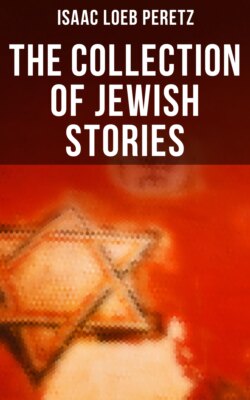Читать книгу The Collection of Jewish Stories - Isaac Loeb Peretz - Страница 9
На сайте Литреса книга снята с продажи.
VII. The Widow
ОглавлениеTable of Contents
The gray, swirling mists have rolled themselves together into one black cloud. It is warm and stifling; it is going to pour with rain; a few drops are falling already. The little house stands just under the hill. The low, thatched roof is full of holes—there is no one to mend it.
The clouds have hidden the sun, and the remaining light is intercepted by the hill.
Inside the hut it is nearly dark; it is late—night is falling.
In the corner, on the chimney-shelf, stands a little empty lamp, with a cracked globe; the naphthaline is exhausted, there is no one to go and buy more. It is closer indoors than out.
The fire-place is not empty, it boasts two or three broken earthenware pots, a handful of ashes, a fragment of polished slate, a little iron stand on legs, but not a spark of fire.
Outside the door lies a log of rotten wood; there is no one to chop it.
The owner of the hut lay sick for a whole year, and with every day of it their little hoard of money grew less. He had saved for a child's sake, "scraped together one hundred rubles, to be lent on interest." God gave a little girl: "It shall be her marriage portion!"
But there came the illness.
The little hoard dwindled and dwindled, and the man's strength likewise. The household goods were disposed of one after another; the last to go was the sewing-machine, and with the last penny out of the bag the soul departed out of the body.
The soiled shred of linen that held the money hangs across a glass of water beside the soul-light.20
A small, tin trunk stands near the door; it belongs to the servant-girl, who has just gone out to look for another situation.
The dismantled room is now all but dark; a few scattered wisps of straw shimmer on the floor; a nail-head stares here and there out of the four walls.
On the wall used to hang a looking-glass (it is not wanted now. If the widow were to see her reflection, she would be terrified). A Chanukah lamp (for whom should it be lighted?) and clothes used to hang there, too. They came and took each his own before he died.
In one corner stands a cradle; in the cradle lies a child, asleep. On the floor beside the cradle sits the newly-made widow.
The thin hands hang helpless, the heavy head rests on the cradle; the eyes, which look as if they had wept themselves out, stare fixedly at the ceiling.
You might suppose she was dead, that she neither felt nor remembered any longer. Her heart scarcely beats, her strength has left her.
And yet one thought is revolving ceaselessly in her brain; no other seems able to drive it away—it is not to be dislodged.
"Hannah," he had once said to her, "hand me the scissors."
He had no use for them just then, and he had given a little artful smile. What had he really wanted?
Did he wish me to go near to him? I was peeling potatoes. Did I give him the scissors? No; just then someone came in—but who? She cannot recollect, and goes puzzling herself—who?
The child sleeps on, and smiles; it is dreaming.
